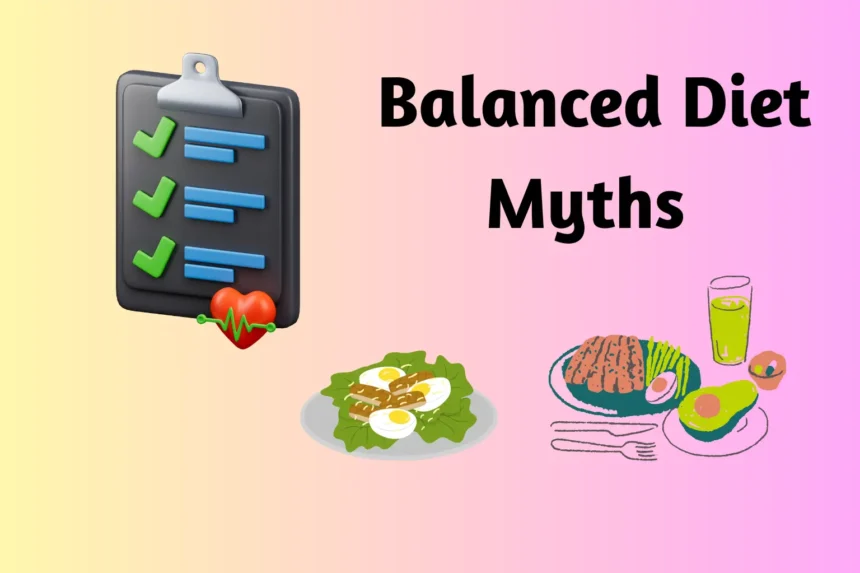Balanced diet myths are everywhere — from social media posts to conversations at the dinner table. Many people believe that eating carbs makes you fat, skipping meals helps with weight loss, or that fats are always unhealthy. These misconceptions not only create confusion but also prevent people from building a truly healthy eating pattern. In this article, we’ll uncover the most common balanced diet myths and share evidence-based facts you can trust.
What Does a Balanced Diet Actually Mean?
Before addressing the myths, it’s important to understand what a balanced diet really is. A balanced diet includes a proper mix of carbohydrates, proteins, fats, vitamins, minerals, and water. It’s not about eating less or avoiding food groups — it’s about eating the right amounts of each nutrient.
Common Balanced Diet Myths You Should Stop Believing
1. Myth: Carbs Make You Gain Weight
Carbohydrates often get a bad reputation, but the truth is, carbs are the body’s main source of energy. Whole grains, fruits, and vegetables are rich in fiber and essential nutrients. It’s refined carbs like sugary snacks and white bread that cause weight gain when consumed in excess.
Reality Check: Choose whole grains like oats, quinoa, and brown rice to fuel your body effectively.
2. Myth: Fat Is Always Bad for You
For years, fats were labeled as the enemy. However, healthy fats like omega-3s and monounsaturated fats are essential for heart health, brain function, and hormone balance.
Reality Check: Include sources like nuts, seeds, avocados, and olive oil in moderation. Avoid trans fats and heavily processed fried foods.
3. Myth: Skipping Meals Helps with Weight Loss
Skipping meals may seem like a quick fix for weight control, but it often leads to overeating later. It can also slow metabolism and cause fatigue.
Reality Check: Eating balanced meals and healthy snacks throughout the day supports energy levels and weight management.
4. Myth: High-Protein Diets Are Always the Best
Protein is important, but consuming it in excess doesn’t guarantee better health. Too much protein, especially from processed meats, can strain the kidneys and increase disease risk.
Reality Check: Aim for balanced portions of lean protein sources like chicken, fish, beans, and legumes.
5. Myth: Supplements Can Replace Whole Foods
Many believe that taking a multivitamin or supplement is enough to stay healthy. While supplements can fill small gaps, they can’t replace the wide range of nutrients and fiber found in whole foods.
Reality Check: Rely on whole foods first, and use supplements only when medically advised.
6. Myth: Healthy Eating Is Expensive
It’s often assumed that eating healthy requires costly organic products or fancy superfoods. In reality, basic whole foods like lentils, seasonal fruits, vegetables, and whole grains can provide excellent nutrition on a budget.
Reality Check: Focus on local, seasonal produce and pantry staples for affordable healthy meals.
Practical Tips to Avoid Balanced Diet Myths
- Read credible sources: Look for advice from registered dietitians and medical websites.
- Check food labels: Don’t trust marketing slogans; read actual nutrition facts.
- Focus on variety: The more colors and types of food you eat, the more balanced your diet becomes.
- Avoid extremes: Diets that completely cut out entire food groups are usually not sustainable.
Internal Link Suggestions
Outbound Link Suggestions
- Harvard T.H. Chan School of Public Health – Healthy Eating Plate
- Mayo Clinic – Nutrition and Healthy Eating
FAQs Section
Q1: Are all carbs unhealthy?
A1: No. Whole carbs like oats, fruits, and vegetables are healthy, while refined carbs like white bread and sugary snacks should be limited.
Q2: Can I eat fats daily without gaining weight?
A2: Yes, healthy fats in moderation support heart and brain health. The key is balance and avoiding trans fats.
Q3: Is it safe to skip breakfast if I’m not hungry?
A3: Skipping occasionally is fine, but making it a habit may lower energy and cause overeating later.
Q4: Do kids also need supplements for nutrition?
A4: Most kids can get all nutrients from a varied diet. Supplements should only be given under a doctor’s guidance.
Q5: Can balanced diets prevent chronic diseases?
A5: Yes, following a balanced diet reduces the risk of obesity, diabetes, heart disease, and other conditions.
Balanced diet myths can lead you in the wrong direction, making healthy eating more confusing than it needs to be. The truth is simple: a balanced diet is about variety, moderation, and quality food choices — not about fear or extremes. Start by ignoring the myths, trusting credible information, and making small, consistent changes to your eating habits.
👉 Want more practical health guides? Share this article and explore other wellness tips on Healthwend.com.


